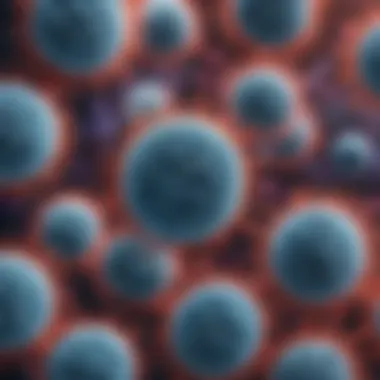Examining the Life and Legacy of Henrietta Lacks


Intro
Henrietta Lacks is not just a name in the annals of medical history; she embodies a story that intertwines personal tragedy with biomedical triumph and ethical malfeasance. In this article, we explore her life, the implications of her immortal cells, and the myriad of conversations that their existence ignited around race, ethics, and the intersection of personal rights and scientific advancement.
Her cells, known as HeLa cells, continue to impact medical research even decades after her death, giving rise to a narrative that deserves meticulous examination. The threads of Henrietta's life cross key themes of justice, consent, and the quest for truth in a society grappling with racial inequities.
This exploration seeks to shed light on the key points that not only contextualize Henrietta's experience but also prompt readers—scholars, students, and medical professionals alike—to deepen their understanding of bioethics in the realm of medicine.
Key Concepts and Insights
Main Ideas from the Book
The narrative of The Immortal Life of Henrietta Lacks is rich with multifaceted discussions. Notably, it raises important questions regarding informed consent and the ownership of biological materials. Henrietta, an African American woman, underwent treatment for cervical cancer at Johns Hopkins in the early 1950s without knowledge that her cells would be taken and used for research without her permission. This lack of consent highlights significant ethical boundaries in medicine.
- Essential Themes:
- The intersection of race and ethics in medical research.
- The complexities surrounding patient consent and autonomy.
- The contributions of marginalized individuals in advancing science.
Many of the advances in medical research, such as polio vaccines and cancer treatments, utilized HeLa cells, underscoring the importance of these cells. Each of these significant breakthroughs begs the question, who truly benefits from such research?
Practical Applications of Concepts
Understanding the life and legacy of Henrietta Lacks is not simply an academic exercise—it provides crucial lessons for contemporary medical practices.
- Informed Consent Practices: Medical institutions today must prioritize transparent communication with patients regarding how their biological samples will be used.
- Cultural Sensitivity: Healthcare providers must be aware of historical injustices and address the lingering mistrust within communities of color toward the medical establishment.
- Ethical Review Boards: Strengthening the frameworks that regulate research, focusing on ethical practices involving human subjects is essential.
"The story of Henrietta Lacks is not just about cells; it's a testament to human dignity, rights, and the fight for justice in the face of exploitation."
Recommendations and Further Reading
Related Books to Explore
Expanding one’s understanding of the socio-medical landscape can be greatly enriched by other works that often touch on similar themes:
- The Immortal Life of Henrietta Lacks by Rebecca Skloot
- Just Medicine: A Cure for Racial Inequality in American Health Care by Dayna Bowen Matthew
- Medical Apartheid: The Dark History of Medical Experimentation on Black Americans from Colonial Times to the Present by Harriet A. Washington
Additional Resources for Personal Development
For those interested in a deeper dive into the ethical implications and historical context, consider exploring these online resources:
The aim is to create a solid framework for understanding Henrietta's story as it transcends time and affects ongoing discussions about ethics and medical research.
Intro to Henrietta Lacks
The story of Henrietta Lacks is a powerful narrative woven deeply into the fabric of medical history and ethics. Within this exploration, we aim to delve into her life and legacy, shedding light on the implications of her unparalleled contribution to science through the immortal HeLa cells. Understanding Henrietta's role is critical because it sets the stage for discussions around ethics, race, and the evolution of informed consent practices in medical research.
Overview of Her Life
Henrietta Lacks was born on August 1, 1920, in Roanoke, Virginia. Growing up in a poor family, her early life included hardships that shaped her outlook and resilience. After her marriage to David Lacks in 1935, they moved to Baltimore seeking better opportunities. However, days were not always bright, and her health began to falter. In early 1951, Henrietta noticed a troubling lump on her cervix; what followed would change the landscape of medical research forever. At Johns Hopkins Hospital, doctors took a tissue sample, an act that would later spark significant ethical discussions due to the lack of her informed consent.
Henrietta passed away on October 4, 1951, at the tender age of 31, but her cells lived on, unintentionally paving the way for numerous breakthroughs in science. Her life, though relatively short, became symbolically rich as she transformed from an anonymous woman into a pivotal figure in the bioethical discourse and medical research.
Henrietta's Medical History
Henrietta's medical journey began with her visit to the hospital for pain and discomfort. Diagnosed with cervical cancer, the treatment strategies available during that time were limited. The doctors of the era had not fully grasped the implications of taking a person's cells, and Henrietta's consent was neither sought nor obtained. Despite the urgency surrounding her condition and treatments, the sample taken from her tumor would later become a goldmine in scientific research.
This medical history — one of neglect and lack of awareness regarding consent — opens the door to vital conversations about ethics in healthcare. Issues such as the racial dynamics at play, treatment conditions for African Americans, and the broader implications for informed consent challenge us to confront uncomfortable truths. It’s essential to note that the HeLa cells emerged not merely as a tool for research but as a reminder of the human stories behind medical innovations.
The exploration of Henrietta Lacks’ life and her tragic but transformative story raises questions we must consider: What are the consequences of scientific progress? How should one navigate the concerning landscapes of ethics in medicine? These questions underscore the importance of viewing Henrietta's legacy not just through the lens of her contributions but also in the context of her experience as a woman of color in a medical system that often disregarded her humanity.
The HeLa Cells Phenomenon
The saga of HeLa cells is not just a chapter in scientific literature; it's a cornerstone that has influenced countless realms of medical research. These cells, derived from Henrietta Lacks, have ignited discussions about ethics, consent, and the very nature of medical progress. Understanding the significance of this phenomenon goes beyond mere facts—it's an exploration of human rights, scientific discovery, and the potential for both good and ill in the practice of medicine.
What Are HeLa Cells?


HeLa cells are a type of immortal cell line, meaning they can divide indefinitely in a laboratory setting. Discovered in the early 1950s, these cells were taken from the cervical cancer tissue of Henrietta Lacks without her knowledge or consent. Unlike typical cells, which die after a certain period, HeLa cells continue to proliferate, making them invaluable for research. They were the first human cells to be successfully cloned and, importantly, their rapid reproduction paved the way for countless scientific advancements.
To put their importance into perspective:
- Research Applications: HeLa cells have been pivotal in cancer research, virology, genetics, and even the development of the polio vaccine.
- Vaccine Development: They played a significant role in testing the effects of toxins and drugs, assisting in the polio vaccine's rollout in the 1950s.
- Space Research: HeLa cells even took a journey into space, helping researchers understand the effects of microgravity on human biology.
Therefore, HeLa cells represent not just biological material but a symbol of human contribution to science, albeit one that emerges from ethically questionable practices.
Impact on Scientific Research
The impact of HeLa cells on scientific research is monumental. Their ability to reproduce rapidly means they have been a go-to resource for experiments that have changed the landscape of medicine. Here are some noteworthy points:
- Facilitating Medical Breakthroughs: These cells have contributed to numerous breakthroughs. For instance, they have been used to test the effects of radiation and toxic substances on human cells.
- Ethical Awareness: The controversy surrounding the extraction and use of these cells has sparked critical discussions on research ethics, particularly regarding consent and the treatment of marginalized populations. Researchers now face stricter ethical guidelines to ensure transparency and respect for human rights when conducting studies.
- Influencing Policy: The legacy of HeLa cells has prompted changes in policies related to informed consent in medical research. Institutions now emphasize the need for clear communication when it comes to using biological materials from human subjects.
"The story of HeLa cells isn’t just about science; it’s about the intersection of humanity, ethics, and medicine."
In summary, the HeLa cells phenomenon is not only crucial for understanding the landscape of scientific research but also merges into broader discussions regarding ethics, rights, and the socio-political complexities involved in medical advancements. Henrietta Lacks’ legacy prompts us to reflect on these issues as we push forward into the future of medical research and biotechnology.
Ethical Considerations
The ethical considerations surrounding the narrative of Henrietta Lacks are as complex as they are important. They highlight the intersection of science, race, and morality within the medical field. In this narrative, her story is not just about the science of HeLa cells but also about the rights of individuals when it comes to their own bodies. The implications of ethical dilemmas are profound, challenging our understanding of consent, justice, and societal norms in the realm of healthcare.
Lack of Consent
One of the most significant ethical issues in the story of Henrietta Lacks is the issue of consent. Henrietta's cells were taken without her knowledge or permission, throwing a wrench in the gears of medical ethics. In those days, the concept of informed consent was far from rigidly enforced, especially for patients like Henrietta, a poor African American woman. This raises numerous questions:
- What does true consent entail in the medical landscape?
- How should healthcare providers communicate with patients, particularly marginalized groups?
- What safeguards should be in place to protect individuals from similar situations today?
Henrietta's case serves as a wake-up call, forcing a critical reevaluation of existing practices. The lack of consent becomes not just a narrative of a person's rights being trampled but an ongoing conversation about ethical obligations in research. While HeLa cells have undeniably advanced medical research, they came at the cost of a woman’s autonomy.
"In taking Henrietta’s cells, researchers not only ignored her personal rights but also contributed to a systemic issue of racial inequity in medicine."
The Role of Race in Medical Ethics
The intersection of race and medical ethics is woven intricately into Henrietta Lacks's story. Historically, African Americans have been subjected to unethical medical practices, often without recourse or accountability. Henrietta's experience reflects a broader pattern of exploitation and inequity. The systemic issues surrounding race shed light on how medical advancements often fail to consider the communities from which they arise.
Key insights include:
- The persistent racial biases in clinical settings.
- The differing standards of care and access to medical treatment based on racial backgrounds.
- The societal implications when ethical considerations are relegated to the background in scientific pursuit.
Despite all the strides made in medical ethics, the reality is that race continues to play a significant role in who is heard and who is ignored. As we reflect on Henrietta’s life and the use of her cells, we must grapple with the broader implications for race and equity in healthcare today. It's evident that ethical frameworks must evolve to address these enduring disparities.
Through understanding these ethical considerations, readers can appreciate the depth of Henrietta's legacy— one that goes beyond scientific achievement, resonating deeply within the realms of human rights and social justice.
The Intersection of Science and Humanity
The relationship between science and humanity is a crucial theme interwoven throughout the narrative of Henrietta Lacks. At its core, this intersection examines how scientific progress can often overlook the very human element involved—people’s lives, rights, and dignity. As we discuss Henrietta's life and her unwitting contribution to medical science, it becomes evident how her story represents a larger saga of human struggle against what often seems like a cold, calculating scientific landscape.
The significance of this theme lies in the constant tension between scientific advancement and ethical considerations. On one hand, scientific inquiry has led to remarkable breakthroughs that have transformed healthcare and enhanced our understanding of diseases. On the other hand, these advancements raise pressing questions about personal autonomy and moral responsibility. It’s like walking a tightrope where both sides hold an essential weight, and falling on either end has consequences that can be deeply affecting. In the case of Henrietta, her cells have prompted breakthroughs, while the circumstances of their acquisition can’t be overlooked.
Scientific Advancement vs. Human Rights
When we peel back the layers of scientific advancement through the lens of Henrietta Lacks' story, we confront a variety of uncomfortable truths about human rights violations. The world of biomedical research often dances perilously close to ethical quandaries, particularly when it comes to consent—a fundamental human right. Henrietta’s cells, now known as HeLa cells, were taken without her consent. This act, while not uncommon at the time, opens an abyss of discussion around the principles of informed consent in medical research.
The ramifications of not securing consent are manifold:
- Trust Erosion: The medical establishment suffers a credibility blow. When patients feel their autonomy is not respected, trust in healthcare systems falters.
- Exploitation of Vulnerabilities: Marginalized groups often bear the brunt of exploitation in research practices. Henrietta was a poor African American woman, and her plight underscores the systematic disparities that persist.
- Ripple Effects on Policy: The absence of proper consent practices can lead to broader ethical implications in policy-making. Ongoing discussions about bioethics are shadows of historical transgressions against individuals like Henrietta.
So, the crux of the matter lies in striking a balance, ensuring that the relentless pursuit of knowledge respects individuals' rights and dignity. The scientific community must grapple with these ethical responsibilities while pushing the envelope of what is possible. Amidst the achievements, one must not forget the human stories behind them.
Legacy of Henrietta Lacks
Henrietta Lacks’ legacy stretches far beyond her HeLa cells. While her cells have powered countless discoveries in cancer research, virology, and genetics, it is the human aspect of her story that resonates. Henrietta’s life and the circumstances surrounding it invite a critical look at the interplay between race, ethics, and medical research. Her story is now a cornerstone in discussions about bioethics and informed consent, prompting new policies and practices to prevent similar injustices.
Here’s how Henrietta’s legacy continues to influence various fields:
- Educational Initiatives: More educational programs focus on ethics in science, utilizing Henrietta’s story as a driving case study. It teaches new generations about the importance of respect and consent in research.
- Policy Changes: Influencing legislation regarding informed consent has been one of the significant shifts her story has inspired, leading to safer practices for participants in medical studies.
- Recognition and Memorialization: Henrietta is now recognized not just as a patient, but as a vital contributor to scientific progress. Her story has been celebrated in literature, films, and discussions, shedding light on the often-hidden narratives of those whose lives were sacrificed in the name of science.
In essence, Henrietta Lacks remains a vital symbol in the ever-evolving dialogue about ethics, human rights, and the responsibilities of science towards the very people it aims to heal. Her legacy prompts us to continuously reflect on the balance—or imbalance—between scientific pursuits and human dignity.


Key Themes in the Narrative
Exploring the narrative of Henrietta Lacks reveals intimate layers of human experience interwoven with scientific triumphs and ethical quandaries. These themes create a textured backdrop that invites readers to ponder essential questions about identity, family, and the varied interpretations of support systems within a complex societal framework. The narrative’s richness lies not only in the significance of the events unfolding but in how they strike a chord with the reader’s own understanding of what matters in life, science, and moral responsibility.
The Quest for Identity
The quest for identity is central to the story of Henrietta Lacks and her immortal cells. On one hand, Henrietta’s biological identity was largely overshadowed by her cells’ extraordinary capabilities within medical research. The HeLa cells became synonymous with groundbreaking advancements in science, yet the individual behind these cells remained largely unknown and uncelebrated for decades.
For her family, especially her children, the quest for identity took a different shape. They grappled with their own existence being tethered to the legacy of their mother, a woman many only knew through fragments and stories shared over family gatherings. In many ways, Henrietta’s identity was split into the scientific, the maternal, and the hidden, making it complicated. This multilayered discussion touches on the very essence of how individuals relate to their lineage, especially under circumstances where overt recognition is stripped away.
"A person’s true essence cannot be captured by mere cells; it's in the stories we tell and the bonds we forge that real identity lies."
Family Dynamics and Support
Family dynamics play a pivotal role in the narrative, illustrating a balance of love, loyalty, and the struggles that often accompany medical crises. After Henrietta's death, her family found themselves navigating the tumultuous waters of grief while contending with the ramifications of her cells' usage. The lack of informed consent added layers of betrayal to their experience, raising profound questions about loyalty and trust in medical systems.
Support varied significantly across family members. Some sought to honor Henrietta's legacy by advocating for recognition, while others initially struggled with the weight of her influence on scientific progress. The dynamics were often fraught with tension, exacerbated by socio-economic challenges and a broader cultural backdrop of racial discrimination.
In this context, the narrative emphasizes the role of family support not only as a crutch during difficulties but also as a source of resilience in confronting larger societal injustices. The Lacks family's journey reflects how love and support can either bridge divides or become points of contention in the light of an individual’s legacy; this principle resonates with many families facing similar crossroads in times of hardship.
Through examining these themes, readers gain insight into the intricate tapestry of interrelations and societal influences that shape individual narratives, thus framing an important discussion about identity, family, and the moral implications of scientific advancement.
The Author's Perspective
The exploration into Henrietta Lacks’ life and the subsequent scientific phenomena surrounding her cells necessitates not only an understanding of the facts but also an appreciation of the narrative chosen to convey these complexities. In this article, the author’s perspective becomes a pivotal lens through which the intertwined themes of science, ethics, and humanity unfold. This perspective invites readers to appreciate the profound implications of Lacks' story, bringing to light the personal and societal facets that might otherwise remain unexamined.
Rebecca Skloot's Research Journey
Rebecca Skloot's odyssey into uncovering Henrietta Lacks' story is a remarkable testament to the blend of journalism and science. Driven by a desire to illuminate the life of a woman overshadowed by the very cells that brought monumental advancements in medical research, Skloot embarked on an intricate path filled with challenges.
Skloot’s initial encounter with HeLa cells while in a community college biology class catalyzed her interest. She recognized the significance of these cells and felt an imperative to connect them with the woman behind them. Her research journey was not merely academic; it was a deeply personal quest that involved years of investigation, numerous interviews, and an earnest effort to gain the trust of Lacks' family.
Through decades of meticulous research, Skloot navigated sensitive topics tied to race, ethics, and personal history. Her commitment to integrity and representation fueled her desire to honor Lacks’ legacy, aiming to portray her identity beyond being a medical resource. Skloot’s journey was characterized by the need to balance the scientific with the human, highlighting not only the contributions of HeLa cells to science but also the lack of awareness regarding the unethical practices surrounding Henrietta's story. Ultimately, her journey aims to inspire readers to consider the broader implications of biomedical ethics and the human stories underlying scientific advancement.
Narrative Style and Structure
Skloot’s narrative style in "The Immortal Life of Henrietta Lacks" is an engaging tapestry that intertwines various elements of storytelling with rigorous research. The book flows in a way that connects personal anecdotes with historical context, allowing readers to trace the impact of Lacks' cells across decades while simultaneously discovering the rich tapestry of her life.
The structure of the narrative employs a dual timeline; one foot in the past exploring Lacks’ life and health struggles, the other in the present, examining the implications of her cells and their usage in science. Each chapter builds upon the last, creating a rhythm that keeps readers invested in both the scientific and the personal narratives.
Moreover, Skloot’s use of multiple perspectives—ranging from scientists and medical professionals to Lacks’ family members—adds depth to the storyline. This careful juxtaposition encourages readers to grapple with issues of consent, ethics, and the human experience in the face of scientific progress.
"The story of Henrietta Lacks is a story of exploitation, but also of hope and resilience. Skloot's narrative does not shy away from the complexities of this duality, which enhances the reader's understanding of the interplay between race, ethics, and science."
Her distinctive approach melds the emotional and the factual, allowing the audience to walk the fine line between admiration for scientific progress and the discomfort surrounding its ethical implications. By offering insight into Skloot’s narrative choices, readers are led to a thoughtful contemplation of the ongoing conversation about fairness in medical research, particularly for marginalized communities.
Cultural and Societal Reactions
Understanding the cultural and societal reactions to the story of Henrietta Lacks is crucial to grasping its wider implications. These reactions not only encapsulate how her narrative has been received by the public but also illuminate significant conversations surrounding race, ethics, and the intersection of science with human rights. They reflect the evolving dialogue in health care and research regarding consent, equity, and representation.
Media Representation of Henrietta's Story
The media has played a pivotal role in shaping public perception of Henrietta Lacks and her immortal cells. Various platforms, from books to movies, have reintroduced her story to a broader audience.
For example, Rebecca Skloot's book, The Immortal Life of Henrietta Lacks, is a cornerstone in this representation. The book not only centers on Henrietta’s life and legacy but also dives deep into the socio-political context of the time. It exposes the systemic racism prevalent in medical practices, showcasing how Lacks’ cells were used without her knowledge or consent and how this continues to resonate with current discussions on racial inequities in medicine.
Similarly, the HBO adaptation of the book brought her story to a new audience. It sparked discussions about representation in media and highlighted Okanag's contributions to both scientific advancement and the ethical dilemmas surrounding her treatment. There’s a fine line in media portrayals: they encapsulate her struggle and accomplishments, yet they often gloss over the collective pain experienced by her family and community.
Public Discussions on Bioethics
The reactions to Henrietta’s story have spurred extensive public discourse on bioethics. Individuals and organizations alike have called for a reevaluation of informed consent practices in medical research. The conversation isn’t merely theoretical; it's deeply personal, as many communities of color still feel the echoes of historical injustices in medical settings.
Some key points in these discussions include:
- Informed Consent: The case of Henrietta Lacks has become a symbol for the need for transparent and informed consent processes in medical research.
- Equity in Research: There’s an increasing push for ethical guidelines that prioritize the voices and importance of marginalized groups in research.
- Education on Bioethics: It’s essential to educate both the public and medical professionals about the ethical implications of their work to prevent further exploitation.
As the narrative of Henrietta Lacks continues to unfold, it not only highlights her immense contributions but also acts as a catalyst for a broader conversation about ethics in science. Ultimately, her experience serves as a poignant reminder that the impact of research goes beyond laboratories and textbooks; it touches lives in profound and often painful ways.
"Every piece of medical knowledge has a human story behind it, a personal history intertwined with scientific discovery."


Through these conversations, society strives to honor Henrietta Lacks not just as a source of cells but as a woman whose life serves as a vital lesson in ethics and respect for autonomy. Her legacy is one of not only scientific breakthrough but also a clarion call for justice and humanity in healthcare.
Impact on Policy and Legislation
The account of Henrietta Lacks has stirred not just the scientific community but also the corridors of power where health policies are crafted. Her story serves as a touchstone in legislative changes regarding medical and research ethics. The importance of this topic lies in its implications for informed consent, ethical considerations surrounding race in medical research, and how these factors have been woven into the fabric of contemporary health policy. This journey through policy-making showcases how one individual’s legacy can inspire sweeping changes across an entire field.
Changes in Informed Consent Practices
Informed consent was often a mere formality in the past, treated as a checkbox rather than a genuine promise of respect for individual autonomy. Henrietta’s experience has catalyzed an evolution in consent protocols that emphasize transparency and respect. Now, informed consent is not just about signing on the dotted line; it’s about empowering individuals in the process.
Some key changes in practices include:
- Clear Documentation: Now, institutions are required to ensure clarity when detailing how a patient’s biological material will be used in research. A patient's understanding must be verified through comprehensive discussions.
- Ongoing Consent: Researchers must secure ongoing consent when possible. This means that as studies evolve, patients are kept informed and have a say in further use of their tissues.
- Accessibility of Information: Medical jargon is being replaced with more accessible language, ensuring that patients from all backgrounds can grasp the implications of their consent.
These alterations are not just technical modifications; they signify a broader cultural shift in how individuals are treated within scientific frameworks. The goal is clear: create an environment where trust can flourish between research entities and the communities they engage.
Influence on Health Equity Initiatives
Health equity initiatives have gained considerable traction as a direct consequence of Henrietta’s story. The legacy of her case helps to illuminate disparities in healthcare that exist, particularly among marginalized groups. Addressing these inequities requires more than acknowledgment; it necessitates action in both policy and practice.
The following points illustrate the impact on health equity:
- Focus on Marginalized Populations: Policies are increasingly prioritizing research that addresses the health needs of underrepresented populations. This ensures that data gathered is reflective of diverse experience rather than skewed by predominant narratives.
- Community Engagement: Health initiatives are embracing community involvement, ensuring that the voices of those affected are included in decision-making. This builds trust and enhances the validity of research outcomes.
- Equitable Access to Healthcare: Legislative changes are pushing for equal access to medical treatments for all patients, regardless of their socioeconomic status. This has resulted in increased funding for community health programs aimed at improving healthcare access in underserved areas.
“Henrietta's cells were a breakthrough, but her story is a reminder of the ethical gaps that still need bridging.”
In summary, the impact on policy and legislation stemming from Henrietta Lacks’ story is profound and multi-faceted. These changes reflect an ongoing commitment to rectifying historical wrongs and fostering a more equitable health landscape for future generations. The lessons learned continue to spark discussions on ethics, justice, and the importance of valuing every individual's contribution to science.
Continued Legacy in Science and Medicine
The impact of Henrietta Lacks extends far beyond her lifetime and the initial use of her cells in research. The continued legacy in science and medicine is marked by significant advancements, persistent ethical discussions, and policy transformations that have emerged from her story. Henrietta’s cells, known as HeLa cells, have played a crucial role in several arenas of biomedical research and continue to contribute to advancements in various fields.
Ongoing Research and Developments
HeLa cells have not only remained vital since their first isolation in 1951 but have also paved the way for ongoing research that spans diverse areas like cancer, genetics, and virology. The cells are robust and versatile, offering valuable insights into cell growth, metabolism, and the mechanisms of diseases.
Research utilizing HeLa cells has led to:
- The development of the polio vaccine, which has eradicated the disease in many parts of the world.
- Pioneering advancements in cancer research, where understanding tumor behavior has been fundamentally enhanced.
- Studies on the effects of radiation and toxins on cells, significantly impacting environmental health.
The advantages of HeLa cells include their ability to reproduce indefinitely in laboratory settings. This quality has made them a staple in experimental procedures, facilitating several breakthroughs that would have been challenging otherwise. Moreover, researchers are finding new ways to utilize HeLa cells in gene editing technology, aiming to treat various genetic disorders. The ongoing developments showcase not just the scientific significance but also the uncanny ways through which Henrietta's life continues to resonate in modern biomedical research.
Henrietta's Influence on Modern Medical Ethics
The narrative surrounding Henrietta Lacks is inextricably linked to the influence on modern medical ethics. Her story serves as a poignant reminder of the ethical responsibilities that accompany scientific inquiry. The concerns surrounding consent and the use of human subjects in research have taken center stage ever since her cells were used without her knowledge.
- Revamping Informed Consent: Henrietta's legacy catalyzed changes in informed consent practices. Researchers today are more compelled to seek explicit permission before using biological materials, ensuring that subjects are fully aware of how their tissues might be utilized.
- Addressing Racial and Economic Disparities: Her experience calls attention to the often overlooked racial and economic disparities within medical research. Henrietta, a Black woman whose cells were exploited without her family's consent, has become a symbol of the ethical complexities surrounding race in medicine. Conversations sparked by her story encourage professionals to scrutinize racial biases and strive for equitable practices in the medical field.
- Creating Ethical Guidelines: Institutions and ethical boards now have frameworks that stem from the lessons learned from Henrietta's situation. The power dynamics, exploitation, and the autonomy of patients are significantly considered in discussions and protocols regarding medical research today.
Henrietta Lacks may no longer walk this Earth, but her presence looms large in the halls of science and ethical governance. The fusion of her legacy with ongoing research developments not only highlights the advances in medicine but also stresses the imperative of ethics in nurturing a more just scientific community.
"Her life and legacy lead us to consideration that every cell has a story, and those stories matter."
As we delve deeper into modern medicine, Henrietta's contributions—ethical and scientific—provide a compelling framework, urging us to proceed with both curiosity and caution.
Culmination
Reflecting on the tale of Henrietta Lacks, we find ourselves at the crossroads of history, science, and ethics. The significance of a well-rounded conclusion in this narrative is paramount; it serves not just to summarize the events but to draw connections between the past and the future of medical ethics. In a world that constantly grapples with advancements in science, Henrietta's story reminds us of the human element that often gets overshadowed in labs and research facilities.
Reflection on the Ethical Implications
The ethical considerations arising from Henrietta's case resonate deeply. Here is a woman whose cells changed the landscape of medical research, yet her personal story is one of neglect and exploitation. The issues of informed consent, particularly in research involving marginalized populations, can’t be overstated. It compels us to ask:
- What constitutes consent?
The understanding of consent must go beyond the mere signing of paperwork. Henrietta had no idea her cells would not only be taken without her permission but would also proliferate for decades. - How do we value human life?
In Henrietta's life and after, we see a divide in how human lives are valued based on race and class. Ethical research practices must evolve to ensure equity in healthcare and protect individuals from being exploited.
"The ethical ramifications of using Henrietta’s cells extend far beyond the lab; they touch the lives of all who seek medical advancement without acknowledging the human cost."
Henrietta Lacks: A Lasting Symbol
Henrietta Lacks stands as a symbol, a figure of both inspiration and caution. Her legacy stretches through laboratories and hospitals, sparking conversations that linger in social justice circles and academic discussions alike. By examining her life and the ongoing implications of her cells:
- We learn about the intersection of race and medicine where historical injustices shape modern ethics.
- Her story is a rallying cry for better informed consent processes that empower patients.
- Henrietta's trial has transcended her personal experience to become a catalyst for legislation aimed at strengthening protections for individuals in medical research.
In essence, Henrietta's name will continue to echo in the halls of medical ethics as a reminder of the crucial need for humanity in science. Her life and legacy demand that we not only remember the lessons learned but actively apply them to ensure history does not repeat itself.
As we close this exploration, it becomes evident that Henrietta Lacks is more than just a name in a textbook; she is a beacon guiding us through the often murky waters of ethics in medical research.







